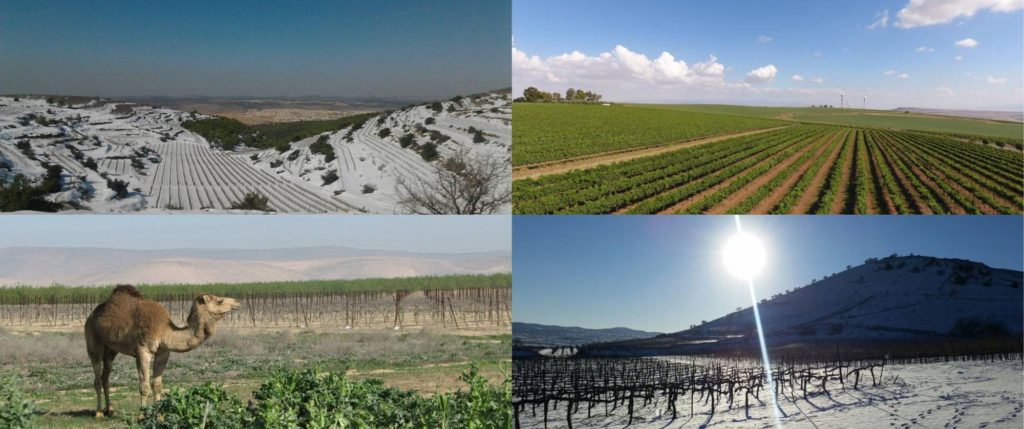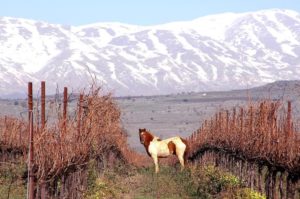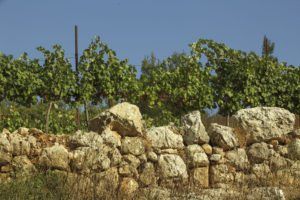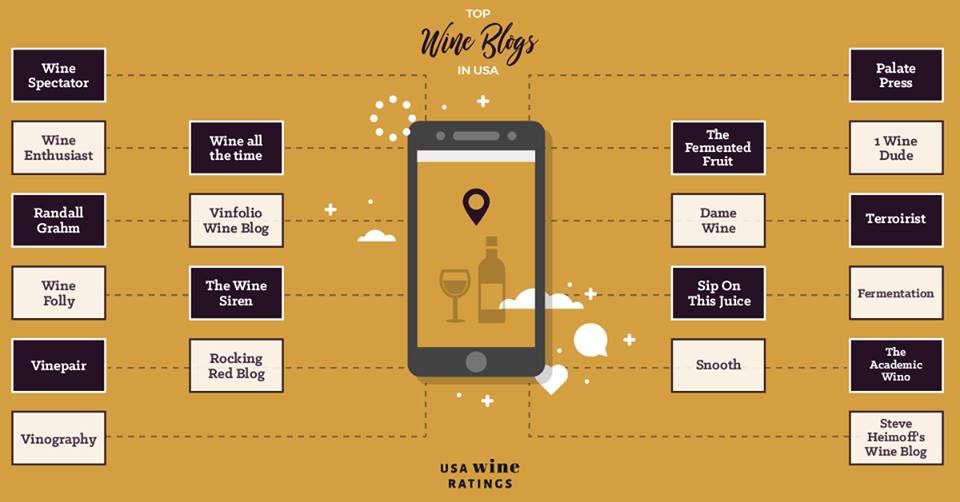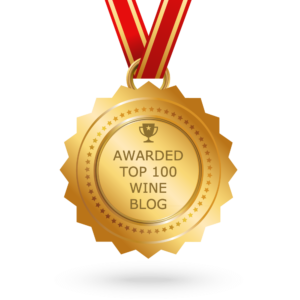The world around us is changing faster than most of us can keep up, and combined with the idea that the internet and over-saturation of news makes it all too tempting for even respectable newspapers to go for the sensational spin, it is a difficult time to have a balanced viewpoint. Yes, journalism is vital to a free democracy and I vehemently support it but we are living in times where tribalism (my team is better than your team) reigns supreme and it becomes which side is bad and which is good instead of actively trying to understand different circumstances to ultimately better the world for everyone. In this world of demonizing any group that slightly opposes our own views, many get caught in the crossfire.
Israel
As an American, I am welcomed, for the most part, around the world with open arms (and no, I don’t tip in places where tipping isn’t part of the culture, but always at least 20% in New York City of course) and I never spend that much money as I am always on a tight budget, and so there are other factors at play. For one thing, the US has a very powerful media and entertainment industry that reaches the globe so many will be familiar with some aspects of the melting pot of cultures that exist here, and when someone is familiar with a people they seem less threatening. The idea that we are so diverse with our ancestry, lots of us being mutts, many people around the world can see themselves in our TV shows and movies. And so, for the most part, whether traveling around Europe or Vietnam or Indonesia or China, I have always met friendly people, outside of those trying to sell me something, that were happy to help me out or just wanted to pick my brain to learn more about my personal American experience… as well as me trying to learn more about their world. There have only been a few exceptions but those insults hurled at me by strangers were then followed by xenophobic comments against other countries as well and I realized in that moment that the issue is with that particular person’s prejudices against anyone not superficially exactly like them.
But there are other countries that are not so lucky and they only get one sliver of its world shown around the globe – Israel certainly falls into this category. One of the greatest things about being a poor, or even struggling middle class, person in New York City is that if you are lucky enough to live in a multicultural neighborhood, you meet people from all areas of the world; some Europeans, Pakistani, Chinese, Korean, Palestinian and Israeli, as well as a whole array of countries and cultures are represented. Every financially struggling person is dependent on their community to survive, and so, in my case, I depended on people with all sorts of origins as they depending on me to get by; very early in life I realized that I couldn’t judge a people by its government and that things, in general, are a lot more complicated than waving a magic wand to create peace.
Diversity of Culture in Israel
Whether you agree or disagree with the current Prime Minister (PM) of Israel and his conservative party, it is still important to note that there are around 17 parties as a whole represented in the Israeli government and the last election for the PM was pretty close. I’m not going to get into politics and judge one side against the other as that is not the point, but it is the idea that there are all sorts of different types of people in Israel that each see a different path to get to the same place; the same can be said about Palestine, China and America. But unfortunately, only one type of Israeli news sells internationally, when in reality it really only makes up a tiny percentage of the average person’s life there.
 One falsehood commonly believed in America that I will dispel is that the ancestry of the Israeli people does not go beyond Europe and the Middle East, as most of us probably would guess. In fact, there are people who have come from South America and parts of Africa – especially Ethiopia as some Ethiopians are Jewish. Also, the second largest city in Israel, Tel Aviv, is one of the top LGBT friendly cities in the world to visit and they host the largest Pride parade in the Middle East and Asia. The city of Tel Aviv is broken up into different worlds as there is the clubbing, beach scene that reminds one of Miami, the European quality of the cafés surrounding the tree lined walkway of Rothschild Blvd, and the free, liberal, open minded atmosphere that is represented by the smell of marijuana in the air.
One falsehood commonly believed in America that I will dispel is that the ancestry of the Israeli people does not go beyond Europe and the Middle East, as most of us probably would guess. In fact, there are people who have come from South America and parts of Africa – especially Ethiopia as some Ethiopians are Jewish. Also, the second largest city in Israel, Tel Aviv, is one of the top LGBT friendly cities in the world to visit and they host the largest Pride parade in the Middle East and Asia. The city of Tel Aviv is broken up into different worlds as there is the clubbing, beach scene that reminds one of Miami, the European quality of the cafés surrounding the tree lined walkway of Rothschild Blvd, and the free, liberal, open minded atmosphere that is represented by the smell of marijuana in the air.
I was even surprised at all the street art that I witnessed, even in the supposedly conservative city of Jerusalem, as well as fun craft beer bars and the still lingering smell of cannabis in the food markets (I guess they are not that conservative), which was a fun contrast after visiting the Old City which contains holy sites for Christianity, Islam and Judaism – highly recommended even if you are an atheist as it is a pretty incredible place.
Wine Regions
Like its people, the topography of Israel is quite diverse as it is a long thin country and it has various microclimates and aspects. It is possible to ski on Mount Hermon, in the Golan Heights, in the morning and later that day go scuba diving in the Red Sea to explore the coral reef; ranges in elevations are as extreme as the Mount Hermon ski resort located at 6,690 feet (2,040 meters) above sea level contrasted by the Dead Sea, the lowest point on earth, at 1300 feet (396 meters) below sea level. So one can only imagine the multitude of terroirs for the wide variety of grapes such as Cabernet Sauvignon, Carignan, Syrah, Grenache, Petit Verdot, Sémillon, Sauvignon Blanc, Chenin Blanc and indigenous varieties such as Marawi, Dabouki, Bittuni and many, many more.
There is a proposal to change and update previous wine region categories (currently: Galilee, Golan Heights, Shomron, Samson, Judean Hills and Negev) to reflect the realities of today. They are as follows:
Galilee (Upper and Lower)
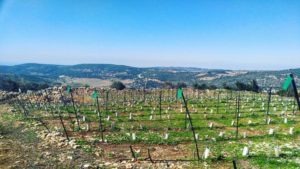 The Upper Galilee is a mountainous area in the north of Israel – forests, plunging peaks and stony ridges and Israel’s most beautiful vineyard region. The soils are heavy but well drained. They tend to be a mixture of volcanic, gravel and terra rossa soils ranging from altitudes of 1,150 feet (650 meters) to 3,280 feet (1,000 meters). Winter temperatures range from 32F (0C) to 59F (15C) and summer is 54F (12C) to 86F (30C) with around 800 to 1,000 mm of rain a year. The Lower Galilee is situated near Mount Tabor with 656 feet (200 meters) to 1,312 feet (400 meters) in elevation and soils that are volcanic and limestone with 400 to 500 mm of rain a year.
The Upper Galilee is a mountainous area in the north of Israel – forests, plunging peaks and stony ridges and Israel’s most beautiful vineyard region. The soils are heavy but well drained. They tend to be a mixture of volcanic, gravel and terra rossa soils ranging from altitudes of 1,150 feet (650 meters) to 3,280 feet (1,000 meters). Winter temperatures range from 32F (0C) to 59F (15C) and summer is 54F (12C) to 86F (30C) with around 800 to 1,000 mm of rain a year. The Lower Galilee is situated near Mount Tabor with 656 feet (200 meters) to 1,312 feet (400 meters) in elevation and soils that are volcanic and limestone with 400 to 500 mm of rain a year.
Golan Heights
The Golan Heights is a volcanic plateau rising to 3,940 feet (1,200 meters) above sea level. The area benefits from cool breezes from the snow covered Mount Hermon. Temperatures can be as cold as 20F (-15C) in winter and 55F (12C) to 85F (30C) in the summer with 800-1000 mm of rain a year.
Coastal Plain
The Coastal Plain area can range from sea level to 330 feet (100 meters) and the vineyards are along the Mediterranean Sea. It is a hot, humid region but most of the vineyards have been replaced by real estate and other more desirable places have been established to plant vines.
Central Mountains
Mount Carmel, the Menashe Hills, the Shomron Hills and the Judean Hills make up the Central Mountain Region. The main concentration of vineyards is in the valleys surrounding the winery towns of Zichron Ya’acov and Binyamina, benefiting from the southern Carmel Mountain range and cooling breezes off the Mediterranean Sea. This was one of the first regions planted with vineyards by Baron Edmond de Rothschild, as mentioned before, and the elevations rise to almost 500 feet (150 meters) above sea level with a Mediterranean climate and 400 to 600 mm of rain a year.
The Judean Hills is known for having a few small superstars with higher elevations with some reaching 3,280 feet (1,000 meters) giving them cooler weather. Many Israeli wine experts consider the Judean Hills to be the leading region for white wines due to the amount of limestone in the vineyards as well as the high elevations; the soils are thin terra rossa on a bedrock of limestone. Also the vineyards tend to be in nature reserves, surrounded by Mediterranean herbs as well as fossils found in the vineyards, showing the ancient history of this region.
The southern tip of the Central Mountains is Yatir Forest, Israel’s largest planted forest with over 4 million trees, and is the meeting place between the mountains and the desert.
Judean Foothills
The Judean Foothills is made up of small vineyards and many tiny wineries, bisected by the road from Tel Aviv to Jerusalem. There are rolling hills with chalky soils and clay loams. Some areas reach almost 1,000 feet (300 meters) above sea level and it averages around 500 mm of rain a year.
Negev
Only a tiny percentage of vineyards are planted in the Negev desert but it is seen as the frontier for Israeli winemakers as the swings in temperatures are extreme and it has many pockets of microclimates, such as the world’s largest erosion crater, Ramon Crater, creating a much cooler environment. There are also high altitude vineyards that go over 3,000 feet (915 meters) and the dry climate creates low disease pressure; one of the biggest issues for the Negev vineyards are roaming camels that sometimes eat a vine to its roots but in the grand scheme of things, it is certainly manageable. There is only 50 to 100 mm of rain per year.
It has Taken Some Time to Find Their Own Sense of Place
Israel has an ancient winemaking history that is said to go back 5,000 years but it was discontinued for a time once there was Muslim rule in 700CE and winemaking didn’t return until Château Lafite’s Baron Edmond de Rothschild decided to plant vineyards, starting with Cabernet Sauvignon and Carignan, in Israel during the late 1800s, building a modern winery (for the time), and giving Jewish refugees a place to become grape growers, eventually giving the land and winery to his workers.
For a time, the wine industry was on hold in Israel until the 1980s when they brought in technology from California and then tried to make wines just as good as France and California – two places that have greatly influenced them. But during the past couple of decades they have realized that they need to find their own sense of place and style and the definition of wine regions are being created… and in a way this is just the beginning of unlocking what is unique about this Eastern Mediterranean country.
Israel is fascinating in the sense that it is an ancient winemaking country that was discontinued for a time and so they focused on trying to live up to other places once they restarted their tradition in making wine instead of digging into their own hidden jewels. But that is changing as the wine world does want something different, something exotic, something authentic – and Israel has that in spades – and so they have been finally embracing what makes them different while balancing the knowledge that has been passed on by other successful winemaking countries.
This evolution of the wine industry is in line with the growth between Palestinians working with Israelis and there is even a dating app to connect young people on both sides, as with each generation they will find more ways to come together even if it is, for now, just on a small scale here and there because those in power on both sides are making it difficult. But the last thing we should do is punish a whole nationality because we disagree with their government as there are many that are working everyday to bridge connections and that will only get stronger with time. All of us will get to a point when we will have to make a choice between wanting to be absolutely in the right and leaving others in the wrong, or be willing to admit that we don’t have all the answers and that we misjudged others so we can stop repeating history. One will tear us apart in ways we still cannot imagine while the other might, unfortunately, continue to be an unattainable dream; all of us need to make that step forward as people can’t hear us if we don’t start off listening ourselves.
****************************************************************
This post was inspired by the Wines of Israel seminar at the Society of Wine Educators Conference in Washington DC.
Wines of Israel Tasting/Seminar on August 16th, 2019
 -2018 Dalton Winery Pét-Nat, Upper Galilee:
-2018 Dalton Winery Pét-Nat, Upper Galilee:
This Pét-Nat (Pétillant-Naturel) is a great example of the current experimentation going on in the Israeli wine scene. Dalton was one of Israel’s pioneering wineries to explore the use of Mediterranean varieties and their head winemaker Guy Eshel (U.C. Davis trained) is given a certain amount of wine by owner Alex Haruni so he can experiment with various techniques such as natural winemaking.
This wine is majority Sémillon coming from sustainable vineyards in the mountainous area of Upper Galilee which is known for its mixture of volcanic, gravel and terra rossa soils with some parts having limestone.
Sémillon began fermenting in tank with native yeast and just before completion was blended with a small amount of sweet Muscat of Alexandria and transferred to bottle where it completed fermentation. The fermentation in the bottle causes the wine to be effervescent and also slightly cloudy.
The wine has aromas of fresh bread and honeysuckle with grapefruit and green apple flavors that has a lively, bright finish.
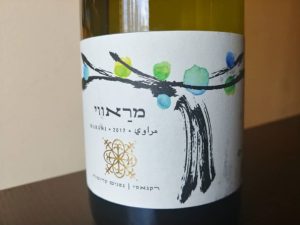 -2017 Recanati Winery Reserve Marawi, Central Mountains (Judean Hills):
-2017 Recanati Winery Reserve Marawi, Central Mountains (Judean Hills):
Recanati Winery is owned by Lenny Recanati, a native of Israel with ancestral roots stretching back to Italy, and this winery fulfills Lenny’s life-long dream to produce truly world-class wines. His chief winemaker Gil Shatsberg (U.C. Davis trained) has helped make Recanati one of the most heralded Israeli wines in the US as well as Israel.
The variety Marawi (Arabic) , also known as Hamdani (Hebrew) is one of a handful of ancient indigenous varieties that are being researched in Israel and Recanati has been placing a focus in finding and working with indigenous varieties such as this Marawi first commercially released in 2014 and now they have a red indigenous variety on the market called Bittuni.
This Marawi is actually sourced from a vineyard in Palestine located in the region of the Judean Hills in Bethlehem. The grapes are dry farmed at 2460 feet (750 meters) from a small 1.5 acre (.6 hectare) vineyard from 30 year old vines. The vineyards has limestone and clay soils and the grapes are hand harvested.
They are still experimenting with this wine trying to find the ideal expression of varietal characteristics and sense of place and the 2015 was more mineral driven while the 2016 had more stone fruit and this 2017 has a combination of the flinty minerality, juicy apricot, lanolin and honeysuckle notes with a hint of spice from its time in one year old French oak.
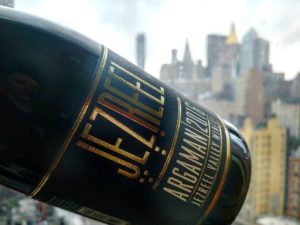 –2016 Jezreel Valley Winery Argaman, Central Mountains (Jezreel Valley):
–2016 Jezreel Valley Winery Argaman, Central Mountains (Jezreel Valley):
Jezreel Valley Winery is a boutique producer that was established in 2012 by founders Jacob Ner-David and Yehuda Nahar with a goal of creating wines that have a unique statement and they have done that by becoming a specialist of the Argaman variety (an Israeli wine grape that is a crossing of Souzão and Carignan), and they have received high praise for their efforts.
These grapes are sourced from the agricultural moshav, Givat Nili, that is referred to as the “Tuscany of Israel” because it is a small village surrounded by vineyards, fruit trees and gardens. It is a single vineyard located in the Central Mountains area in Israel that is hand harvested.
This wine aged 15 months in 300L second year French oak.
This Argaman has a deep ruby color and soft tannins which is characteristic of the variety with juicy wild berries, forest floor and singed rosemary with a lovely freshness on the finish.
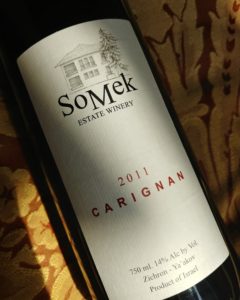 –2011 Somek Estate Winery Carignan, Central Mountains (Mt. Carmel):
–2011 Somek Estate Winery Carignan, Central Mountains (Mt. Carmel):
Somek Estate Winery was founded by Barak and Hila Dahan in 2002 with the aim of producing quality wines that reflect the terroir of the Zichron Ya’acov in Mt. Carmel which benefits from the southern Carmel Mountain range and cooling breezes off the Mediterranean. The winery only uses grapes from their family vineyard cultivated since 1882.
The owner, Barak Dahan, is a 5th generation vintner in Zichron Ya’akov, Mt. Carmel, as his ancestors first came to this town in 1882 to work on Baron Rothschild’s newly established vineyards at the time; and his family has been growing Carignan for five generations.
The wine is from a single vineyard estate of 40 year old Carignan.
It was aged for 24 months in French oak and allowed to age in bottle for two years before being released. Some bottles have been held back such as this 2011 so to offer older vintages to the market.
This Carignan has an intense minerality that has notes of limestone and brambly berries with wild sage with hints of baking spice and fine-grained tannins.
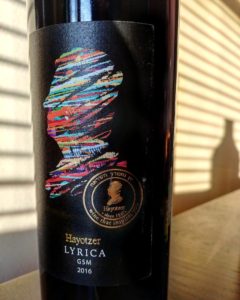 –2016 Hayotzer, Arza Winery, Lyrica GSM, Central Mountains (Judean Hills):
–2016 Hayotzer, Arza Winery, Lyrica GSM, Central Mountains (Judean Hills):
Hayotzer Winery is the boutique winery of the Shor family, who established their first winery in 1847 in the Old City of Jerusalem. The winery operates on the belief that wine is a work of creative art representing the person who made it and the place where it’s grown.
These grapes come from the area of the Judean Hills in the Central Mountains and the area has warm days and cooling winds from the Mediterranean that moderate the temperature with cool nights. The soils are thin terra rossa and stony on a bedrock of limestone. The vineyards in the Judean Hills are planted among nature reserves and fossils in the area show the ancient history of this region.
This is a blend of 40% Grenache, 35% Syrah and 25% Mourvèdre that was aged in French oak barrels for 18 months.
Delicious nose of crushed stones and black cherry with notes of fresh flowers, Herbes de Provence and juicy blackberry on silky texture.
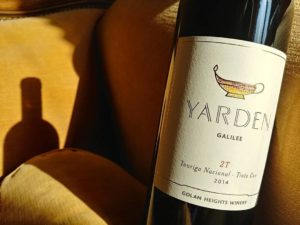 -2014 Golan Heights Winery Yarden 2T, Golan Heights:
-2014 Golan Heights Winery Yarden 2T, Golan Heights:
Golan Heights Winery was established in 1983 by four kibbutzim and four moshavim (cooperative communities). The winery has planted 20+ grape varieties in 28 vineyards divided into roughly 450 blocks, at elevations ranging from 1310 to almost 3940 feet (400-1200 meters) on the volcanic slopes of the Golan Heights.
This is a red blend of the Portuguese varieties Touriga Nacional and Tinta Cão made famous by the high quality wines of the Douro Valley.
The grapes were harvested from two vineyards in the Golan Heights: Springs Vineyard at 2300 feet (700 meters) and Geshur Vineyard at 1300 feet (400 meters) above sea level.
This Yarden 2T was aged for 18 months in (40% new) French oak barrels.
This 2T has a real silky texture with good mid-palate weight of ripe black cherry and blackberry fruit yet has an overall sense of finesse that was highlighted by a smoldering earth and spice cake notes. A wine with real weight yet very food friendly.
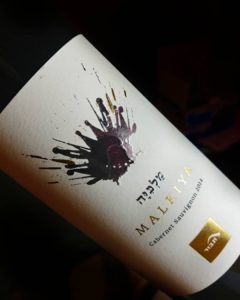 –2014 Tabor Winery Malkiya Cabernet Sauvignon, Upper Galilee:
–2014 Tabor Winery Malkiya Cabernet Sauvignon, Upper Galilee:
Tabor Winery was founded in 1999 in the Galilee region by four families of grape growers who have been growing grapes uninterrupted for over five generations.
This Cabernet Sauvignon comes from a single vineyard at an elevation of 2382 feet (726 meters) on Mount Malkiya in the Upper Galilee. The topsoil is terra rossa but underneath, only eight inches (20 centimeters) down, is one of the most unique soils Tabor’s viticulturalist, Michal Akerman, has ever seen in Israel. In English, it is called “a lot of stars” since there are limestone rocks throughout the soil that gives the visual impression of this name. She said that it was a piece of land that many of the local people thought to be undesirable for any type of crop, but that she somehow, to their amazement, was able to produce the best Cabernet Sauvignon she has ever seen.
The grapes were hand-picked and only the free-run juice was used and then aged for 18 months in new French oak barrels with an additional one year of aging in bottle.
This wine has a nose of blackcurrant leaves and cloves that has a stony minerality with well-knit tannin and juicy cassis flavors that has an overall sense of elegance.


